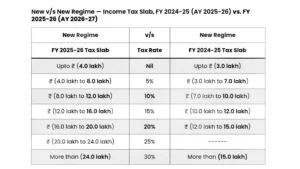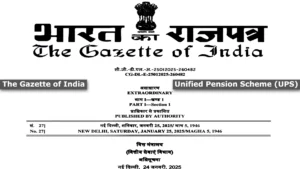
How to Calculate Pension Under the Unified Pension Scheme (UPS)
The Unified Pension Scheme (UPS) does not include provisions for allowances like medical benefits, which were available under the Old Pension Scheme (OPS). The gazette notification only outlines basic pension and Dearness Relief (DR).

The annexure outlines assumptions for calculating the admissible monthly assured payout under the Unified Pension Scheme (UPS). Key points are:
- Average Basic Pay (P): ₹45,000 is the 12-month average basic pay before retirement.
- Qualifying Service (Q): The employee has completed 25 years of service (300 months or more).
- Full Contribution Credit: All contributions were made without missing credits.
- Investment Pattern: The employee opted for the default pattern of investment.
- No Withdrawals: The employee did not make any partial withdrawals from the corpus.
Calculation Summary for Scenario 1:

The assured payout formula is:

Where:
- P: Average Basic Pay = ₹45,000
- Q: Qualifying Service in Months (capped at 300 if exceeds) = 300
- IC: Individual Corpus at Retirement = ₹50,00,000
- BC: Benchmark Corpus = ₹50,00,000
Steps:

Final Assured Payout:
₹22,500 + Applicable Dearness Relief (DR)
Note: This case fulfills all conditions, so the assured payout equals the full assured payout.
Calculation Summary for Scenario 2:

The assured payout formula is:

Where:
- P: Average Basic Pay = ₹45,000
- Q: Qualifying Service in Months = 180
- IC: Individual Corpus at Retirement = ₹30,00,000
- BC: Benchmark Corpus = ₹30,00,000
Steps:

Final Assured Payout:
₹13,500 + Applicable Dearness Relief (DR)
Note: Since ![]() is not less than ₹10,000, there is no adjustment for the minimum payout.
is not less than ₹10,000, there is no adjustment for the minimum payout.
Calculation Summary for Scenario 3:

The assured payout formula is:

Where:
- P: Average Basic Pay = ₹45,000
- Q: Qualifying Service in Months = 120
- IC: Individual Corpus at Retirement = ₹25,00,000
- BC: Benchmark Corpus = ₹25,00,000
Steps:

Final Assured Payout:
₹10,000 + Applicable Dearness Relief (DR)
Note: Since ![]() is less than ₹10,000, the payout is adjusted to the minimum assured payout of ₹10,000.
is less than ₹10,000, the payout is adjusted to the minimum assured payout of ₹10,000.
The other scenario define in the gazette notification under the Unified Pension Scheme (UPS) as shown below:
Lump Sum Payment on Superannuation or Voluntary Retirement (VRS):
Eligibility:
Applicable to employees with at least 25 years of qualifying service at the time of superannuation or VRS.

Components Considered:
- Basic Pay: Final basic pay at retirement.
- Dearness Allowance (DA): Calculated as a percentage of the basic pay (e.g., 53% in this case).
- Total Emoluments: Sum of basic pay and DA.
Formula for Lump Sum Payment:
The lump sum amount is determined as:
Lump Sum Amount = 1 / 10 × Total Emoluments × L
Where L = Number of completed six-monthly periods of service.
Example Calculation:
- Basic Pay: ₹45,000 or ₹72,800
- DA (53%): ₹23,850 or ₹38,584
- Total Emoluments: ₹68,850 or ₹1,11,384
Using the formula, the lump sum payment is calculated as:
6,885×L (₹6,885 for every six months of completed service)
₹11,138×L(₹11,138 for every six months of completed service).
The lump sum payout under superannuation or VRS depends on basic pay and dearness allowance. For ₹45,000, it’s ₹6,885 per six-month period; for ₹72,800, it’s ₹11,138. Multiply by total periods for the final amount.
This ensures a one-time payout proportional to the service length and emoluments at the time of retirement.

What Is the Lump Sum Amount at the Time of Retirement?

If you have any questions, need assistance, or encounter challenges, feel free to share your concerns in the comments. The CountLen team is dedicated to providing quick and effective solutions. If you notice any inaccuracies or misleading information, please provide feedback—we’re here to support you!












